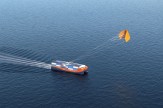Experiential learning on seven continents
A Northeastern University biochemistry and marine biologyprofessor and one of his undergraduate students are preparing to embark on a six-month expedition to Antarctica to study the effect of global climate change on marine organisms.
Professor Bill Detrich and third-year biochemistry student Corey Allard will investigate the impact of warming seas in the South Polar Ocean on embryonic development in Antarctic fish.
From April through September, Allard will work and live at the United States Palmer Station, which is located near the Antarctic Circle; Detrich will work in Antarctica during April and May.
Allard’s role in the project will contribute to the scientific community’s understanding of climate change and prepare him to pursue a PhD. “The idea that my work might have even a small impact on a highly relevant topic keeps me very motivated,” he says. Allard is the first Northeastern undergraduate to work in Antarctica.
He will monitor the impact of the ocean’s rising temperature—over the last 50 years, the sea temperature west of the Antarctic Peninsula has increased 1.8 degrees Fahrenheit—on the development of fish embryos by studying when and where embryos express critical genes.
Embryos that develop in slightly warmer water may express these genes at incorrect stages or locations, Detrich says, causing fish to grow abnormal jaws or fins.
Warmer waters might also speed up embryonic development, causing fish to hatch before food becomes available. Normally, hatching occurs in September, when the breakup of sea ice allows young fish to swim to phytoplankton, a staple of their diet.
From an ecological point of view, says Detrich, fish embryo deaths or developmental abnormalities caused by warmer ocean temperatures could drastically alter the size of those fish populations, in turn affecting the predators — such as penguins, whales, and seals — that rely on the fish for food.
In addition to illuminating the possible impacts of climate change, Detrich says the team’s research on cold-blooded Antarctic icefish could shed light on human diseases, including cancer and osteoporosis.
“Our ability to compare . . . processes such as cell division and bone formation in organisms with cold versus warm body temperatures provides a novel ‘lens’ for understanding fundamental biological mechanisms” and how they are altered by disease, he says.
The National Science Foundation and the National Institutes of Health fund Detrich’s research in Antarctica.





